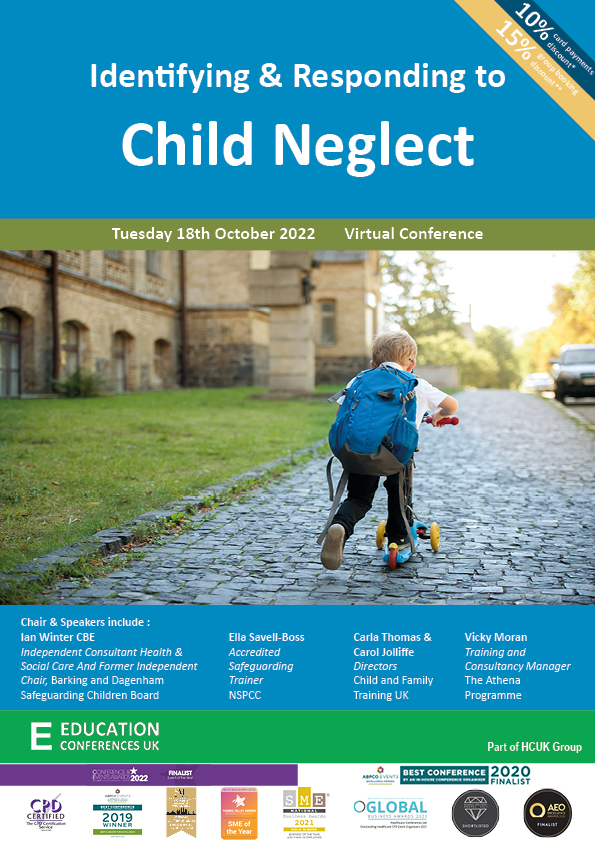Find out more about virtual attendance
Follow this conference on Twitter with #childneglect2022
This conference focuses on improving the recognition, assessment and response to child neglect.
Neglect is defined as “The persistent failure to meet a child’s basic physical and/or psychological needs, likely to result in the serious impairment of the child’s health or development. Neglect may occur during pregnancy as a result of maternal substance abuse. Once a child is born, neglect may involve a parent or carer failing to: a. provide adequate food, clothing and shelter (including exclusion from home or abandonment) b. protect a child from physical and emotional harm or danger c. ensure adequate supervision (including the use of inadequate caregivers) d. ensure access to appropriate medical care or treatment It may also include neglect of, or unresponsiveness to, a child’s basic emotional needs.” Working together to Safeguard Children HM Government
“All staff should be aware of indicators of abuse and neglect (see below), understanding that children can be at risk of harm inside and outside of the school/college, inside and outside of home and online. Exercising professional curiosity and knowing what to look for is vital for the early identification of abuse and neglect so that staff are able to identify cases of children who may be in need of help or protection.”
“It is important for children to receive the right help at the right time to address 138 safeguarding risks and prevent issues escalating and to promote children’s welfare. Research and serious case reviews have repeatedly shown the dangers of failing to take effective and immediate action. Examples of poor practice includes failing to act on and refer the early signs of abuse and neglect.”
“There has been insufficient attention to, and investment in, securing the specialist multi-agency expertise required for undertaking investigations and responses to significant harm from abuse and neglect”
“Protecting children from abuse and neglect is a multi-agency endeavour. When things go wrong, a lack of co-ordination across agencies is often a key issue.”
This conference will enable you to:
- Network with colleagues who are working to safeguard children from neglect
- Learn from the lived experience of child neglect
- Reflect on national developments and learning
- Improve the training and education of frontline staff to examine and question marked changes in children and young people’s behaviour or emotional state
- Implement an effective multi agency framework for child neglect
- Develop your skills in identifying and understanding child neglect
- Understand how you can improve support for children and improve identification in education
- Identify key strategies for effective intervention – delivering a model of assessment, child – centred interventions and measures of outcome
- Understand the long-term impact of neglect on children physical, educational and emotional development
- Improve record keeping & information sharing in child safeguarding
- Improve support and intervention for parents
- Ensure you are up to date with the latest legal issues and developments
- Self assess and reflect on your own practice



